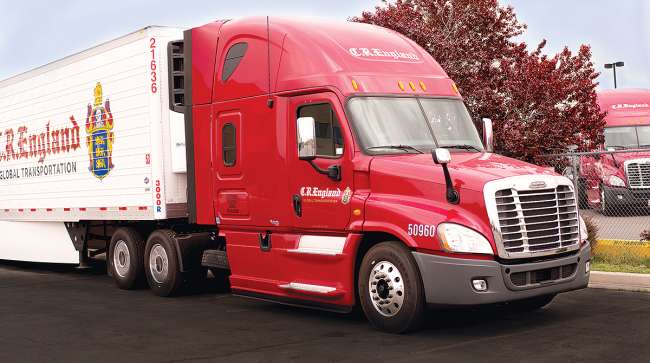Staff Reporter
Truck Driver Training Programs Overcome COVID Risks

[Ensure you have all the info you need in these unprecedented times. Subscribe now.]
As the coronavirus gripped the nation, companies across the trucking industry were forced to alter their operations while confronting the pandemic. For some, that included driver training and orientation.
“We’ve done quite a few things,” Brad Ball, president of Roadmaster Drivers School, told Transport Topics. “We stopped training on the weekends and enhanced our cleaning efforts. We started handing out protective gear to the students. We’re requiring masks on campus and 6-foot distancing.”
Roadmaster, which has locations nationwide, is a unit of Werner Enterprises, which ranks No. 16 on the Transport Topics Top 100 list of the largest for-hire carriers in North America. Werner also is No. 17 on the TT Top 50 list of the largest logistics companies.
“We reduced the number of students we have in school because of social distancing, and we actually took out chairs and computers so the students are sitting 6 feet apart,” Ball said. “All of our schools across the country have a lower maximum number of students in the classroom.”
Ball added that each location educates students on the risks posed by the coronavirus. That includes having signage around each facility and a class that covers those risks.
“The first thing that we did was we met with our physician and outlined a questionnaire to make sure that anybody we were bringing in did not have an extra risk in contracting COVID,” Travis Bacon, manager of driver recruiting at Prime Inc., told TT. “We required everyone to pass that questionnaire.”
Prime Inc. also took steps to keep students separated. The fleet has spread out classroom times to more days a week and conducted training virtually.
“We also started going to a virtual orientation,” Bacon said. “Basically, we were having them complete their interviews virtually, all the classes that they are able to do virtually.”
Prime Inc., based in Springfield, Mo., ranks No. 17 on the for-hire TT100.
“It’s been the most unique challenge I have faced in my career personally when it comes to training truck drivers and even recruiting them,” Wayne Cederholm, vice president of driver recruiting and schools at C.R. England, told TT. “A couple big changes that we have made, one is that we do have a remote orientation.”
Cederholm noted there are limits to how much can be done remotely, such as actually driving. But there have been other changes for those circumstances. People are spread out as much as possible, and classroom times have been reduced.
“We provide masks to every single employee, driver, applicant that comes through our facility,” Cederholm said. “We have spread out how many people can go on a truck at any given time. We have completely reduced our ratios.”
C.R. England, which specializes in refrigerated transportation and has a driver training school in Salt Lake City, is No. 26 on the for-hire TT100.
Roadmaster also has explored virtual training but decided against it for now.
“We have dabbled in it, we’ve tested it, and we’re not there yet,” Ball said. “We’re not convinced virtual training is an efficient method of training people who are learning how to drive a truck. It’s a very hands-on thing that we’re teaching here, and we just found that being in the classroom is just the right way to teach this curriculum at this time.”
Schneider announced the creation of its remote driver orientation program Sept. 17. It is designed to ensure new drivers continue to receive quality onboarding while social distancing in a safe and secure environment.
“The remote course that is covered in hotel conference rooms is the same curriculum that is being presented at Schneider training academies,” Tom DiSalvi, vice president of safety, driver training and compliance at Schneider, told TT. “It’s just being broadcasted remotely to allow for even greater social distancing.”
Train For Your Class A CDL in Weeks with the Nationwide Leader in Truck Driver Training. Roadmaster helps students get pre-qualified for jobs before they even graduate school.
To get your career started, call Roadmaster at 1-800-831-1300 today or apply at https://t.co/8QwOa2ZaNq pic.twitter.com/4SliGIHhFb — Roadmaster (@RoadmasterCDL) August 26, 2020
New drivers do orientation remotely from a large conference room at a hotel. DiSalvi noted the setup allows the program to train the same number of students as in the classroom, if not more. The designated hotels are all near one of its training facilities.
“Very little change was required, other than all of our students are now issued Chromebooks,” DiSalvi said. “We have coordinated remote training classes for our office and shop associates in the past, but this is the first time we’ve done remote training for our driver associates.”
Schneider, based in Green Bay, Wis., ranks No. 5 on the for-hire TT100 and No. 18 on the TT logistics Top 50.
Want more news? Listen to today's daily briefing:
Subscribe: Apple Podcasts | Spotify | Amazon Alexa | Google Assistant | More




